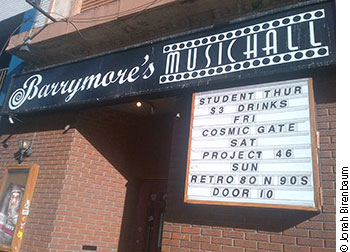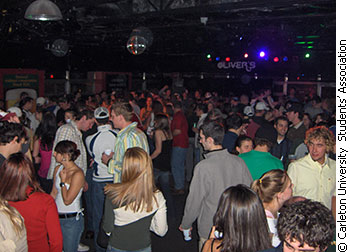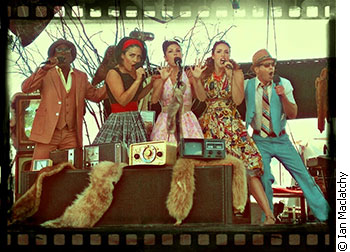Tags
Related Posts
Share This
Ottawa’s music scene: ch-ch-changing
Is live music disappearing from Ottawa nightlife? If so, the PepTides didn’t get the memo: Business is booming for the eccentric Ottawa pop group.

Barrymore’s once hosted bands as big as U2. Now weekends are dominated by electronic acts like Cosmic Gate and Project 46.
“We’re still doing well,” says singer and multi-instrumentalist Claude Marquis, whose band has pervaded the local circuit, playing Irene’s Pub, Ritual, and the Black Sheep Inn two times apiece since January 2012. “We keep getting asked to play. Wherever we end up playing, they sort of respond, ‘We got to have you back.’ ”
But despite the busy schedule of certain Ottawa bands, rumours of the live scene’s gradual demise here have gained considerable traction recently.
Over the past 12 months, two of Ottawa’s more prominent live music venues – Tucson’s and LiVE Lounge – have closed their doors. A recent ownership change at The Elmdale has threatened live music’s future at the Hintonburg hotspot. And Barrymore’s, Ottawa’s iconic rock sanctuary, has embraced the economic allure of top-40 and electronica, distancing itself from its own live music roots. This leaves but a small group of local institutions – the most prominent being Zaphod Beedlebrox, Ritual, Babylon, and Mavericks – as the city’s remaining bastions of live music. In light of the foreboding signs, there’s a discernible ambivalence among Ottawa’s purveyors of live music as to the health of the scene.
A scene in flux
“There’s lots of clubs that are still doing live music that are still doing great,” says Adam Kronick, owner and operator of Bank Street’s Babylon nightclub. “It’s hard to generalize about the whole industry of live music in the city based on a select few wanting, for whatever reasons, to make a change.”
Babylon’s proverbial king since the club’s inception in May of 1998, Kronick was quick to dispel any notion of live music going extinct in Ottawa. Despite his protestations, however, Babylon has amended its own live music mandate in recent years, incorporating more electronica and DJ performances to keep up with music’s transient trends.
“We’re keenly aware that we need to be evolving and responding to new aspects in the market,” he says. “To be still successful after a number of years, you need to evolve your business model. We’re still evolving our business model all the time.”
‘You get DJs booked constantly now. Hopefully it’s not the death of the scene in Ottawa. But it’s definitely changing.’
– Blake Brooks, pub manager
However, Kronick refuses to suggest that ever-evolving musical trends portend the end of live music in the city. “I think it’s really hard to to say from a few examples that live music isn’t going well in Ottawa. I think it’s exactly the opposite,” he says.
Blake Brooks, manager of Oliver’s Pub and Patio, doesn’t share Kronick’s optimism. He says new musical tastes represent a threat to the live scene.
“You get DJs booked constantly now; that’s what younger people are listening to,” he says. “Hopefully it’s not the death of the scene in Ottawa. But it’s definitely changing.”
Brooks fondly recalls his formative years as a Carleton student, when up-and-coming Canadian rock bands would frequent Oliver’s pub, and boisterous crowds would gleefully croon along. These days, however, Oliver’s seldom hosts events featuring live music, and when they do, it’s certainly not marquee acts that are performing.
While renovations have played a large role in the evolution of Oliver’s – the current floor plan isn’t entirely conducive to live music – Brooks says the change has more to do with economics than anything else. “I like it when we do stuff here,” Brooks says of hosting live music, “but we just don’t do it enough, I guess. It’s a money thing more than anything, probably.”

Thirsty Thursdays, a weekly staple at Oliver’s, features DJ performances and routinely draws large crowds.
‘Live’ not dead yet
Though the musical zeitgeist might dictate that electronica is the style du jour, Kronick points to Ottawa’s hugely popular music festivals as an indication of the local appetite for live acts.
Attendance at Ottawa’s Bluesfest – lauded as the second largest blues festival in North America – has grown exponentially since 1994, when the event became an annual staple. More than 300,000 people attended Bluesfest 2012, a 12-day musical binge highlighted by performances by Alice Cooper, Our Lady Peace and Snoop Dogg.
“There’s obviously fans that want to go see music,” says Kyla Clarke, a concert promoter who’s routinely blown away by the Bluesfest crowds. “Why don’t they do it all the time?”
Clarke, who works for the popular Ottawa rock station 106.9 the Bear, says that contrary to popular belief, the infrastructure for a vibrant live music scene still exists in the nation’s capital; she cites the emergence of groups like the Balconies and the Love Machine as testaments to the wealth of local talent. However, it’s become increasingly difficult to get people to show up to see lesser known bands at more obscure venues, she adds.
“I think there’s probably a lack of promotion going on across the city,” says Clarke. “I think people have this idea that like, ‘Oh, no one is going to go, so I’m not going to go.’ ”
And indeed, this perception has compelled club owners to place a greater emphasis on DJ performances. Yet even though electronica has impinged aggressively on live music venues in recent years, some musicians don’t seem to mind. Marquis, whose band performed on Bluesfest’s main stage in 2012, says the two styles can coexist harmoniously.
“There’ll always be a place for both, I believe – for the DJ aspect and for live bands,” Marquis says. “I don’t think it should be a competition. There’s a place for every different kind of art form.”
In fact, Bluesfest 2012 featured an unprecedented number of electronic acts, including performances from MSTRKRFT and Skrillex. But according to Mike Rouleau, Bluesfest’s director of operations, the festival’s identity remains intact.

The retro PepTides, very much live onstage at Bluesfest 2012.
“The vast majority of the festival is still driven by bands and live music and live performances,” says Rouleau, who adds that electronic acts claimed the main stage headlining slot on just two of the festival’s 12 nights.
Meanwhile, the PepTides’ schedule remains full. Admittedly, they don’t play as often as they could, but that’s for fear of exhausting their repertoire.
“We sort of have to refuse some of them,” says Marquis, whose band has sojourned to places like Mississauga, Ont., and Fredericton, NB., in recent months to tap into different markets. “We can’t tire out our audience by performing every weekend.”
But while the PepTides have yet to feel the blowback of Ottawa’s evolving music scene, the consensus remains that the times are a-changing.
“I’ve seen some of those DJs at those venues, and they’re packed,” says Oliver’s Brooks. “People are going to see something, but maybe it’s changed so much.”





